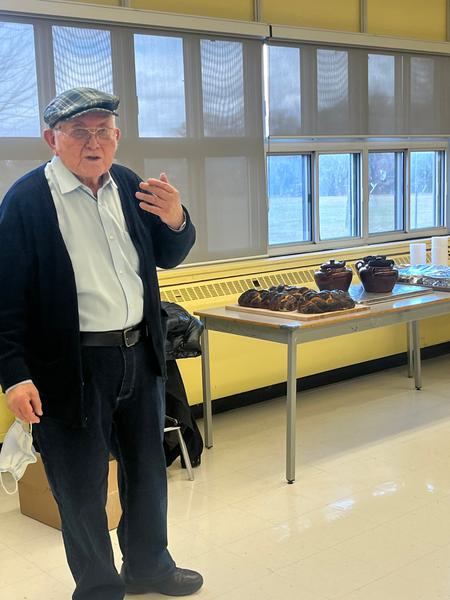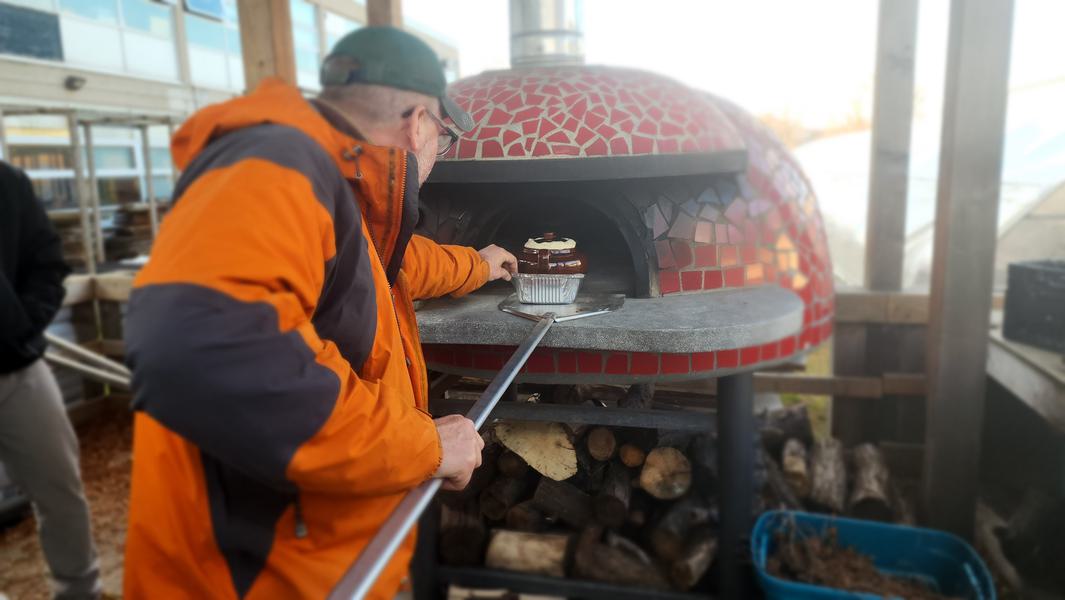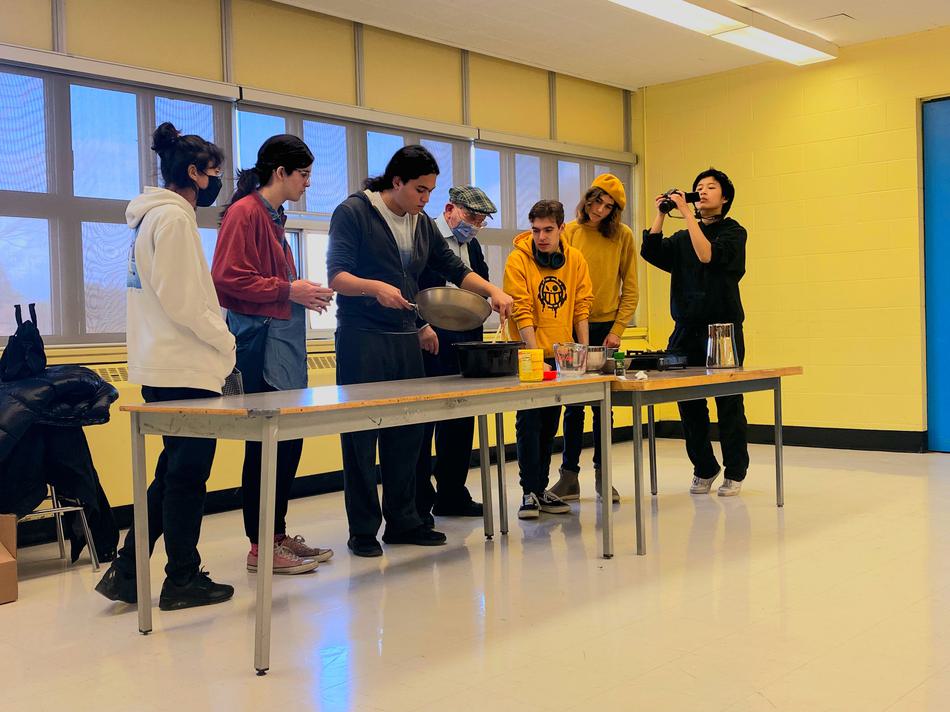Tasting History: How One Grade 12 Class Explores History Through Cholent and More
When we heard about how the Grade 12 World History course at Don Mills Collegiate Institute in Toronto used our memoirs to explore Jewish history through food and stories of survival — and saw the incredible website they created to document these explorations — we asked their teacher, Ben Gross, to write about this inspirational project so that we could share it. What an incredible way to explore history and identity!

Courtesy of Jody Spiegel.
As part of our Grade 12 World History course at Don Mills Collegiate Institute, we spent a lot of time doing interdisciplinary work with Dan Kunanec's Grade 11 and 12 Hospitality and Tourism class. Our final project was learning about the history of Ashkenazi and Sephardic Jews from 1500 to the present and then focusing on food history and experiences. Students did in-depth research on food — recipes, cultural and religious meaning, and changes over time — and selected five recipes mentioned in memoirs published by the Azrieli Foundation’s Holocaust Survivor Memoirs Program to cook as a class. As we worked through this process, Jody Spiegel, the director of the Memoirs Program, gave us all kinds of support, including asking survivor author Pinchas Gutter if he would like to cook with us. And he did! The students from both the history and the hospitality and tourism classes prepared cholent the day before that spent twenty-four hours in a smouldering wood-fired oven. Before Pinchas’s arrival the following day, they spent the morning preparing challah and kugel. And the next week, we made latkes and chocolate mousse. The students also created a website — researched, designed and built by them — documenting their process and results, as well as reflecting on their learning. Below, you will find responses from two students to questions about their experiences in this project and how much this approach to history impacted their notions of what it means to do history.
You can visit the website the students created to document all their investigations into history and food so you too can get a taste of this history.
Taken by students and staff of Don Mills Collegiate Institute.
Response from student ML
1) What did it mean to you to have the opportunity to work with and learn from a Holocaust survivor generally and Pinchas specifically?
Our age group is unique because we are just starting to understand how impactful the past is on the lives of real people. At the same time, it has also been so long since those events that the people who experienced them are becoming less able to spend the time and energy to educate us. We may be the last group of students to have the chance to directly learn from survivors. Currently, I am a student, learning about history from trusted resources: my teachers and elders. Someday, I may put myself in a situation where I will be in charge of educating the next generation, as it is something that sounds interesting and meaningful to me. If that turns out to be the case, I have the responsibility to understand what I am taught, now and for the rest of my life.
Pinchas in particular was very enjoyable to work with. During the day, I was in charge of taking photos for the website. While I was mostly focused on food, I tried to take a few photos of people as well. When he saw the photos, Pinchas asked me to share them with him so he could show his grandchildren. His attitude toward life, moving forward and helping others, was remarkable and made the day extremely memorable. I’m glad I got the opportunity to talk with him about so many other parts of his life outside of the Holocaust.
2) What was your big takeaway from learning about Jewish history outside of the Holocaust?
Aside from providing a fuller picture of Jewish society pre-Holocaust, a part of the learning I found interesting was how antisemitism was a large part of many European countries long before World War II. It became a lot easier to understand how something like the Holocaust could happen with the added context of pogroms and general discrimination towards Jews throughout European history. Suddenly, it wasn’t the evil action of a random group — it was the culmination of more than a thousand years of hatred. It made it clearer that an important part of learning from history is to understand how discrimination and genocides are human problems, caused by humans, with human victims — and must have human solutions.
3) How did this learning connect to your own personal or family experiences of becoming/being Canadian?
The lessons we had on Jewish culture and life had some surprising connections to my family. We studied a few short articles about all the members of a Jewish family who immigrated to America prior to the wars, and their stories, generational differences and experiences sounded strangely familiar to me. Although I hadn’t personally experienced them, some things, like being pulled out of school to work, reminded me of certain friends or relatives. Our class also made a Sephardic cholent, and I was very surprised to see tamarind in the ingredients list. Tamarind is a tasty sweet and sour fruit I ate a lot while I lived in China. Seeing it unexpectedly during a school trip to cook Jewish food gave me a strange sense of nostalgia. Even though I had never made cholent before, I was familiar with the ingredients and felt very comfortable with the process. Hearing Pinchas talk about the ingredients he missed from Poland reminded me of how my mother missed Chinese ham so much when she first came to Canada that she had a friend bring ham from home — for hundreds of dollars — just to steam it with bamboo. To people far from home, things that others take for granted, like familiar food, is a privilege.

Taken by students and staff of Don Mills Collegiate Institute.
Response from student SD
1) What did it mean to you to have the opportunity to work with and learn from a Holocaust survivor generally and Pinchas specifically?
To me, learning from a Holocaust survivor in person made all of the history and trauma often spoken about in history classrooms feel so much closer and more real. I find that the way history is taught in schools often objectifies victims and turns real-life traumatic events into a Scantron memory game rather than an occasion to actually learn and connect with survivors and truly understand the gravity of the situations. Learning with Pinchas is an experience I will never forget. I didn’t just read an article and write a test about Pinchas, I sat with him and spoke to him. I heard stories from his childhood and helped make food from his culture. I think this is the correct way of teaching history.
2) What was your big takeaway from learning about Jewish history outside of the Holocaust?
After the day with Pinchas, I felt more connected with older individuals. It made me stop and think about all of the historical events that the older people in my life have lived through, and it made me re-evaluate my opinions of late family members who I could not fully understand when they were alive.
3) How did this learning connect to your own personal or family experiences of becoming/being Canadian?
When I was in elementary school, I used to get made fun of for not having the same lunches as the other kids. Learning about foods that Pinchas grew up with and being in a class that didn’t immediately call the food gross for being different felt like a small amount of closure. I loved being able to learn about foods from different cultures without judgment and being able to talk about foods from my own culture in class as well without some kid in the back going “ewwww.” I feel like a large part of growing up in Toronto as an immigrant is getting your food made fun of, and I’m glad that we were given a space to connect over food instead of making fun of each other.

Taken by students and staff of Don Mills Collegiate Institute.
Keep exploring food and identity by checking out a previously published blog post in which Jody Spiegel reads through the program’s memoirs for their reflections on food and shares her own cholent recipe (includes a video of Pinchas!)

